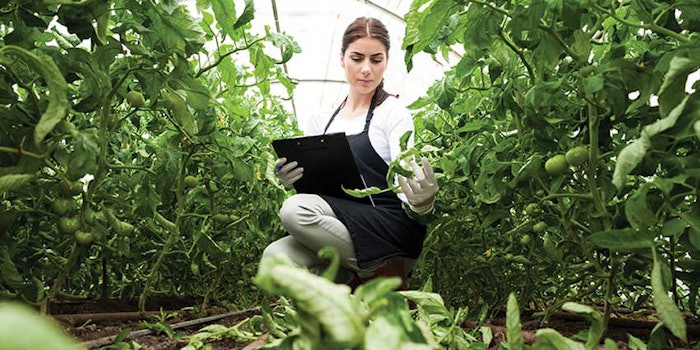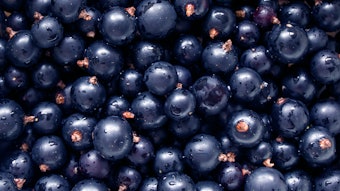
As consumers seek to ensure healthier lives, health and wellness is ever-growing with a focus on better-for-you food and beverages. Vegetarianism, veganism, rawism and flexitarianism are on the rise and have lead to a growing interest in plant-based products. According to Mintel Global New Products Database (GNPD), there was a 25% increase in vegetarian claims and a 257% rise in vegan claims in global food and drink launches between September 2010 – August 2011 and September 2015 – August 2016.
According to research firm Global Data, 6% of U.S. consumers claim to be vegan, up from 1% in 2014, while an estimated 3.3% of adults in the U.S. identify themselves as being vegetarian according to a 2016 Harris Poll commissioned by The Vegetarian Resource. Furthermore, according to a November 11, 2016, Forbes article, organic, functional, allergen-free and better-for-you food sales are projected to reach $1 trillion globally in 2017. In the next five years, the gluten-free market is expected to increase by 68%, paleo 364%, vegetarian and vegan markets 86% and raw 101%.
In addition to plant-based consumer products, the growing demand has lead to plant-based services such as restaurants and supermarkets. For example, By Chloe is an American plant-based, fast-casual restaurant, which opened its flagship restaurant in New York City in 2015. Currently, the company operates eight U.S. locations including five in New York City, two in Boston and one California with expansion plans for two additional New York City locations and a Rhode Island location. To bring the brand to the U.K., Europe and the Middle East, By Chloe has partnered with hospitality management and consultancy firm TGP International. By Chloe’s first European location in London is expected to debut in autumn 2017 with two additional London sites planned. Another notable service is French supermarket chain Naturalia, which opened three all-vegan markets across Paris and are the first vegan-dedicated supermarkets in the country. These three stores were converted versions of the original Naturalia market and carry 2,000 animal-free organic food, beauty and lifestyle products. There are currently 150 supermarkets nationwide with 20 more planned for 2017. Similarly, Israel opened its first vegan supermarket named HaGal Hayarok “Green Wave,” which is modeled after Veganz, a Berlin-based vegan supermarket. Green Wave offers about 4,000 vegan products, such as vegan TV dinners, cookies, ice cream, protein bars, cheese and plant-based milks. The company plans to rollout five more stores across Israel by 2018.
Trendincite’s Forward Thinking columns in Perfumer & Flavorist magazine’s April 2017 and April 2016 issues briefly explored plant-based foods and beauty products. The plant-based market is thriving and growing with activity coming from a shift in consumers’ attitudes and behavior, dairy alternatives such as milk, yogurt and ice cream, nutrition and performance products, meat alternatives and plant-based company acquisitions.
Plants on the mind - consumer attitudes, behavior & consumption
Consumers are changing their consumption habits and are actively incorporating more plant-based ingredients into their diets. According to Mintel research, 55% of U.K. adults include vegetables in meals and 24% incorporate superfood ingredients. Similarly, 35% of Chinese adults aged 20-49 who are hoping to achieve a healthy diet choose vegetarian food and 14% look for products with superfood ingredients. Meanwhile, 30% of U.S. adults who purchase vegetables are trying to eat a more plant-based diet.
A recent study from Technomic reported that only 15% of consumers follow diets that restrict consumption of animal products, while 59% eat meatless meals at least once a week. 27% of consumers aged 18-34 regularly consume vegetarian substitutes, compared to 15% of consumers aged 35+. Additionally, 41% of consumers are eating more vegetables now than they did a year ago. And on occasions when they eat vegetarian or vegan dishes, consumers specifically seek out these items 34% of the time on average.
To explore consumer attitudes toward plant-based protein, ORC International conducted a study on behalf of Lightlife with 1,047 adult participants 18 and over. The study reported that 65% of respondents believe plant-based foods are just as “hearty and satisfying” as animal products. Furthermore, 72% of participants agree that plants are a source of complete protein, 87% admit to eating plant protein regularly and 40% expressed interest in more plant-based protein innovation in the snack category. In addition, the survey found that millennials are more likely than Generation X respondents to reduce animal protein consumption in the future, with 26% committing to actively reducing animal consumption in 2017.
Consumers’ eating habits are also changing when dining out. According to a 2016 Harris Poll commissioned by The Vegetarian Resource Group, 37% of Americans regularly order meals without fish, meat or poultry when eating out. The 2017 Menus of Change Annual Report showed that chefs and other foodservice professionals are influencing consumer behaviors with the rise of plant-forward menus, defined as “a style of cooking that emphasizes and celebrates — but is not limited to — plant-based foods.”
Plant-based protein
Plant-based protein is the marketing buzzword appearing in food and beverages across multiple applications including dairy alternatives, nutrition and performance products and meat alternatives. For the global food and drink market, plant-based proteins are No. 1 for new product development. With options like soy, lentils, hemp and chia, new products featuring plant-based proteins increased from 4% in 2011 to 6.5% in 2016, based on GNPD data. Technavio predicts that the global plant protein market is projected to grow to USD $13.67 billion by 2021, at a CAGR of more than 8% over the forecast period. Research conducted by Packaged Facts indicates that 37% of consumers ages 25 to 39 are likely to seek out plant proteins, the highest of any age group, followed by 22% of adults under age 25.
Land of milk alternatives
There has been a gradual shift away from animal-based milk products towards plant-based options and non-dairy milk, creamers, yogurt and ice cream have been thriving. According to Mintel, the dairy alternative market is booming, with household penetration growing from 27.3% in 2013 to 55% in 2016. Mintel estimates annual sales of plant-based non-dairy beverages at $2 billion, with that figure forecast to climb to $3 billion by 2020. The global market for dairy alternative drinks is expected to reach U.S. $16.3 billion in 2018, up dramatically from U.S. $7.4 billion in 2010, according to Innova Market Insights. Technomic also sees an increasing demand for dairy-free creamers made with plant-based milks and reported total volume for non-dairy beverage creamers rose 13% last year, in contrast to total sales decline and nearly flat volume growth of dairy-based creamers. There has been so much activity in nut milks that there are lawsuits by dairy producers challenging if plant-based milk producers can reference milk, cheese and yogurt from products that originate from plants instead of animals.
Of all the non-dairy varieties available, almond milk is currently the industry’s darling. The almond milk category is projected to grow 36% by 2020, while dairy milk sales are projected to decline 8% by 2020, according to Mintel. According to Nielsen, in the past five years, U.S. sales of almond milk have grown 250% to more than $894.6 million in 2015. In addition, Technavio’s analysts forecast the global almond milk market to grow at a CAGR of 15.45% during the period 2016-2020.
At the Natural Products Expo West 2017, Califia Farms launched its new Homestyle Organic Nutmilks, a premium line of USDA Certified Organic dairy alternative beverages formulated with organic nuts, water, oat fiber and sea salt. The three flavors include: Almond, Cashew and Coconut andarevegan and contain no dairy, GMOs, soy, carrageenan or gluten. At the beginning of the year, Coffeemate introduced the Natural Bliss line to offer consumers an alternative to traditional dairy creamers. Available in four flavors: Caramel Almond Milk, Hazelnut Almond Milk, Vanilla Almond Milk and Sweet Crème Coconut Milk. The brand highlights ingredients such as real almonds, coconuts from Sumatra, vanilla from Madagascar and pure cane sugar.
In 2016, liquor company Baileys debuted Baileys Almande, which was marketed as a dairy-free, gluten-free and vegan Irish cream option formulated with almond milk, almond essence, cane sugar, purified water and real vanilla. However, the company received backlash because the formula contained beeswax and was not considered vegan. In 2017, Baileys reformulated and now the product is vegan-certified.
Cultured non-dairy yogurt
The yogurt aisle is getting a makeover with a plethora of cultured non-dairy products based on a variety of plant-based ingredients such as soy, almond, coconut, cashew, chia, hemp, flaxseed, rice, oat and quinoa.
Forager Project introduced of a new line of Dairy-free Drinkable Cashewgurts, which are crafted with organic cashews and a blend of 10 different probiotics that contain 100 million of total live & active cultures per gram offered in Strawberry, Unsweetened Plain, and Wild Blueberry varieties. The company also offers a line of spoonable Creamy Dairy-free Cashewgurt in seven flavors such as Cherry, Coconut and Lemon. At the end of last year, Good Karma launched a line of dairy-free yogurt based on cold-pressed flaxseed oil that contains Omega-3 healthy fats, 5-6 grams of plant-based protein and has up to seven live active cultures. Blueberry, Strawberry, Raspberry and Vanilla flavors are available.
Kite Hill, the California-based maker of premium nut milk cheeses offers a variety of nut-based products including artisanal nut cheeses, cultured cream cheese-style spreads, frozen ravioli and cultured yogurts. Kite Hill has many new products in development. Expected in September and to be sold exclusively at Whole Foods, the brand will rollout new child-friendly almond-milk yogurt tubes in two flavors: Strawberry-Banana and Wild Berry. Kite Hill will also launch four drinkable vegan yogurts: Berry, Mango, Plain Unsweetened and Vanilla flavors, which will be fortified with probiotics, calcium, and vitamins A, D, and B-12. Additionally, seven flavors of Greek-style yogurt that boasts more than 10 grams of plant-based protein per serving will be introduced.
In addition to the current plant-based ingredients on the market, new products are in the pipeline. Ripple, the makers of Ripple Milk, is launching a dairy-free Greek yogurt using the same proprietary pea protein ingredient dubbed Ripptein. This fall, Whole Foods will stock a new line of Lavva yogurts based on the Pili nut, which is a distinctive, tear-shaped nut native to Southeast Asia and the Pacific islands.
We all scream for dairy-free ice cream
According to Mintel research, the share of global dessert and ice cream launches featuring a vegan claim has increased from 2% in 2014 to 3% in 2015 and 4% in 2016, with Europe accounting for 59% of all launches in 2016. According to Future Market Insights, the global market for plant-based ice-creams will reach a value of US $1 billion by the end of 2017 and is estimated to reach a value of $2.45 billion by 2027.
The plant-based ice cream trend has caught the attention of large ice cream manufacturers including Ben & Jerry’s, Breyers and Häagen-Dazs, all of which are making dairy-free variants. In 2016, Ben & Jerry’s introduced a line of vegan almond milk-based ice cream options in four flavors: Chunky Monkey, Chocolate Fudge Brownie, Coffee Caramel Fudge and P.B. & Cookies. This year, Ben & Jerry’s have added three new non-dairy flavors: Caramel Almond Brittle, Cherry Garcia and Coconut Seven Layer Bar. Also based on almond milk, Breyers introduced Non-Dairy Dessert - OREOa Cookies & Cream and Non-Dairy Vanilla Peanut Butter flavors. In July 2017, Häagen-Dazs debuted a vegan line of ice cream sold exclusively at Target in four flavors: Coconut Caramel, Chocolate Salted Fudge Truffle, Mocha Chocolate Cookie and Peanut Butter Chocolate Fudge. SweetFrog, the global frozen yogurt chain, partnered with Dole Packaged Foods to add six vegan flavors of Dole Whip soft serve to the chain’s menu at its 340 locations. The new flavors include: Lemon, Mango, Orange, Original Pineapple, Strawberry and Raspberry.
Plant-based nutrition and performance products
Based mostly on whey protein, nutrition and performanceproductswere originally marketed to bodybuilders, weightlifters and athletes. The market is still heavily dominated by whey protein products, but it is no longer strictly for athletes. It is marketed to and used by people with active lifestyles. Now consumers are looking for non-dairy nutrition and performanceproteinalternatives and plant-based proteins are becoming increasingly popular. There has been a flurry of activity in plant-based protein powders, ready-to-drink protein beverages and protein bars.
No-whey
Gold’s Gympartnered with C+A Global to develop Gold’s Gym’s own line of protein powders. The Nature Supreme is 100% plant-based protein, gluten free, vegan, non-GMO, soy free and kosher. It is available in Chocolate, Cookies & Creme and Vanilla flavors. Glanbia, the sports nutrition company that primarily produces dairy-based protein products introduced ThinkThin, a new line of vegan, soy-free, GMO-free and gluten protein bars, protein powders and probiotic powders. Burt’s Bees is making a foray into the functional food arena with plant-based protein shakes. The line includes Daily Protein, Protein+Gut Health with Probiotics, and Protein+Healthy Radiance with Antioxidant Vitamins A, C & E formulas, all of which provide 15 grams of protein per serving from five sources — pea, rice, flaxseed, sunflower seed and oat designed to achieve high digestibility and a complete essential amino acid profile. The shakes are non-GMO, gluten-, soy- and dairy-free and also contain vitamins extracted from real fruits and veggies, such as spinach, shiitake mushroom and strawberry.
Drink to your health
Last year, Ripple debuted a line shelf-stable, pea protein-based milks, which are vegan-friendly, lactose, nut and gluten-free and offered in Original, Unsweetened Original, Vanilla and Chocolate Milk varieties. This year the brand launched a kid-friendly line of vegan milk packaged in eight ounce cartons in three flavors: Chocolate, Original and Vanilla. CytoSport Inc., the manufacturer of Muscle Milk, introduced Evolve the company’s first-ever plant-based protein formula. It is a dairy-, soy- and gluten-free, plant-based, vegan formula with 10 essential natural ingredients available in the four flavors: Ideal Vanilla, Toasted Almond, Mellow Mochaand Classic Chocolate. In March 2017,Bolthouse Farms Plant Protein Milk showcased its new pea protein-based milk beverages expected later this year. Positioned as an alternative to almond milk, the line includes Original, Unsweetened, Vanilla and Chocolate varieties.
Chew on this
PowerBar launched a new line of plant-derived protein bars with the main source of protein coming from cashews, almonds, or peanuts and depending on the flavor added pea protein and rice protein crisps. There are three varieties: Dark Chocolate Almond Sea Salt, Dark Chocolate Peanut Butter and Dark Chocolate Salted Caramel Cashew.
That’s it.Veggie is the latest launch from the That’s it brand and features all-natural, plant-based protein and fiber bars formulated with only five ingredients. The four flavors are: Black Bean + Carrot, Black Bean + Corn, Black Bean + Kaleand Black Bean + Pea and the productsarefree from gluten, soy, dairy, wheat, peanuts, and egg, and are non-GMO, vegan, and kosher.
Meaty plant-based alternatives
Consumers crave the texture and taste of meat but without using animal protein. According to SPINS, sales of plant-based meats represent a $606 million market and are growing 2% a year for frozen and 8% for refrigerated. Allied Market Research predicts that the meat alternatives market will reach $5.2 billion by 2020.
Trendincite’s “Forward Thinking: Health and Wellness Reboot” article, which appeared in the April 2016 issue of Perfumer & Flavorist magazine, discussed Impossible Foods’ plant-based cheeseburger, which is now being served in nine Umami Burger restaurants in Los Angeles with plans to expand to chefs in New York, San Francisco and Las Vegas. Beyond Meat is a similar product, which uses pea protein and beet juice to mimic the texture and appearance of ground beef. However, Beyond Meat is marketed to supermarkets and placed in the meat section. The brand is now sold in about 11,000 stores nationwide, including some Walmart, Target, Whole Foods Market and Kroger locations.
The Abbot’s Butcher, aCosta Mesa based vegan “meat” company, produces a variety of products such as “beef” and “turkey” burgers, herb-roasted “chicken” deli slices, Italian “meatballs,” Spanish “chorizo,” and ground “chicken” and “beef,” all made of plant-based ingredients. Beets and tomatoes give color to the products while porcini mushrooms offer a savory, meaty flavor. The non-GMO "meats" contain no artificial colors, flavors or preservatives.
Acquisitions
A tell-tale sign of the importance of plant-based products is the recent activity of large food and beverage manufacturers acquiring plant-based companies across markets.
In July 2017, Campbell’s Soup announced that it will acquire Pacific Foods, the brand known for its shelf-stable, plant-based almond, oat and hemp milk products for $700 million. In order for Danone to complete its $10 billion purchase of WhiteWave Foods, the makers of Horizon Organic milk and Silk soy milk needed to diversify. In July 2017, Danone agreed to sell its Stonyfield brand to rival Lactalis for $875 million. Japanese pharmaceutical company Otsuka acquired Canadian plant-based food company Daiya, known for its dairy-free cheeses and dairy alternatives for CA $405 million (U.S. $325.97 million). Northern California-based vegan cheese company Kite Hill received $18 million in venture capital and General Mills’ 301 venture capital arm was the largest investor with an undisclosed sum.
Last year, the world’s largest meat producer, Tyson Foods, invested an undisclosed sum for a five percent stake of Beyond Meat, a vegan plant-based meat company. Similarly, at the beginning of 2017, Canada-based meat company Maple Leaf Foods acquired Lightlife, a meat-free company known for its Tempeh, for $140 million.
Plants of the future
Driven by the health and wellness lifestyle, consumers are shifting away from animal-based protein sources to plant-based options. The thriving and growing market for plant proteins is happening across markets with a plethora of activity in dairy, meat, and nutrition and performance products. Flexible diets, which incorporate more plant-based ingredients and healthier choices for the environment, will continue to drive further expansion of plant-based formulations with vegetarian and vegan claims. Expect new sources for plant-based formulas, more acquisitions of plant-based companies and more plant-based services such as restaurants and supermarkets. The evolving consumer mind-set and behavioral shift to more plant-based products will create new opportunities and challenges for food and beverage manufacturers, as well as flavor houses to create products that satisfy the desire for flavorful products that do not sacrifice taste or texture.











